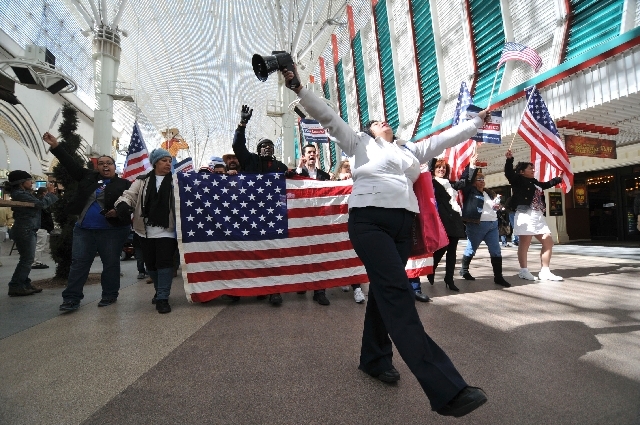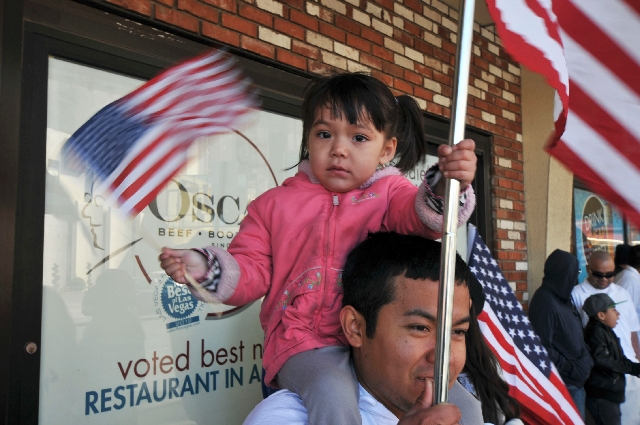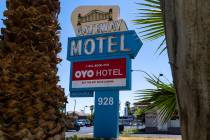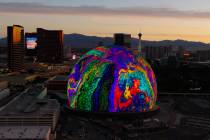American DREAMers
In the middle of politicians debating a broken system, naysayers preaching border security, activists crying out for citizenship and a country discussing immigration reform, Astrid Silva’s first worry is losing her family.
“My biggest fear is being separated from them,” Silva said. “I deal with racism and being told I don’t belong. I deal with the fear of deportation. The issues I have dealt with every single day at my dinner table are finally being brought to other people’s dinner table.”
Silva is one voice echoing in a movement of an estimated 11 million people who are undocumented.
According to a report by the North American Integration and Development Center out of the University of California, Los Angeles, there are an estimated 190,000 undocumented people in Nevada, roughly 7 percent of the population.
Carlos Silva, who is the campaign director for Immigration Reform for Nevada, said he is looking for two things from proposed comprehensive immigration reform legislation.
“We’re hoping that there will be immigration reform with a path to citizenship for all the undocumented families and a stop to deportations,” he said.
The movement also has been shedding light on the current immigration system as a whole.
“The system is broken,” said Leo Murrieta, the Nevada director for Mi Familia Vota, a nonprofit that raises awareness on policy issues within the Latino community. “You have good people who want to do the right thing.”
According to a report by the U.S. State Department, there are 4,412,693 people seeking visas for 2013, with the highest being 1,316,118 from Mexico, 462,145 from the Philippines and 332,846 from India. Some of the applications being processed date to the early ’90s.
“You have people waiting in line from the Philippines for 25 years,” he said. “If I wanted to petition family today (from Mexico), it would be 23 years, minimum.”
The per-country limit of visas to be issued in 2013 will be 26,600, according to the report.
Immigrant visas to be issued during fiscal year 2013 are estimated to be 226,000 for family-sponsored preferences and approximately 154,000 for employment-based preferences.
Jasmine Coca, director of immigration at Catholic Charities of Southern Nevada, 1511 Las Vegas Blvd. North, helps families with applications. Most clients come from Mexico and Cuba, but she has also helped those from Nigeria, Egypt, the Philippines, China, Ethiopia, Canada, Great Britain, France and others.
She helps between 1,000 and 2,000 families annually to prepare family-based petitions in immigration court. Other than dealing with deportation cases, Coca helps unite families with members still living outside the country.
“The complaint we hear is ... it takes forever to get a visa,” Coca said. “Parents could have petitioned in the early 1990s, and they’re waiting 20 years for that visa number to become current. That’s not fair. I’ve had clients where parents petitioned them as teenagers; now they’re in their 30s. Those numbers move so slowly.”
Coca hopes Congress will increase the number of immigrant visas granted each year. Until it does, or until comprehensive reform happens, her clients are helpless.
“A lot of them are here, but they just can’t do anything,” she said. “Probably 99 percent of all immigrants without documentation want to be here legally. They want to be productive members. They want to pay their taxes. They’re trying to do the right thing, but they just need documents.”
Politicians have proposed reform through efforts to help with the immigration process such as the Development, Relief and Education for Alien Minors, or DREAM Act. The measure would have provided a pathway to citizenship for minors who were brought to this country before age 16 and who plan either to attend college or join the military.
The DREAM Act passed the U.S. House of Representatives in 2010 by a 216-198 vote but did not pass in the Senate.
DREAMERS
Among the undocumented are the children. Often referred to as DREAMers, these individuals were brought to this country younger and raised as Americans.
“Being undocumented is the new gay,” Murrieta said, referring to the growing numbers of DREAMers coming out to share their stories. “If you humanize it, we win. It’s no longer a stranger. It’s your neighbor.”
Astrid Silva was born in Mexico in 1988 and moved to the United States in 1992. She has lived in Las Vegas since 1993, when her father received a job offer.
It was small things that tipped her off that her situation was different from her friends’ lives.
Her parents didn’t let her join cheerleading in sixth grade –– it required a health check and medical records.
When she was in seventh grade and won a scholarship to go to New York, her parents didn’t let her go.
“I thought they were the worst people in the world,” she said. “Now that I’m older, I know they only thought I wasn’t able to fly.”
Reality began to sink in at 16 when everyone around her boasted about driving, yet she wasn’t able to.
“I realized I didn’t have a Social Security number,” she said.
At 18, Silva said she felt alone. She couldn’t apply for scholarships for college. She didn’t volunteer. She didn’t join clubs. Even though she was an honor roll student, she enlisted in only two courses at the College of Southern Nevada.
“I kind of dropped off the face of the Earth,” she said.
Watching President Barack Obama in 2008, Silva decided to get involved in the movement for comprehensive immigration reform.
Still, she had a lingering fear that someone would find out, so she kept volunteering limited.
She started volunteering when she was asked to attend a rally for Sen. Harry Reid in 2009.
After struggling to get into the rally –– she originally left when asked to write her personal information –– she arrived to hear Reid speak. She was greeted by his Hispanic outreach coordinator and ushered into the rally.
“It was an emotional experience for me,” she said. “It was the first time I had really heard someone talking about DREAMers. He was talking about me.”
After the rally, the outreach coordinator took her to meet Reid.
“I was nervous,” she said. “I thought he was going to deport me.”
Instead, Reid gave her the first bit of hope she could cling to in years.
“He said, ‘Together, we are going to get this done,’ ” Silva said. “It was the first time I knew I wasn’t alone.”
She began volunteering for his campaign. Reid, as well as others on the campaign, became more acquainted with Silva’s story.
“And then he outed me at a rally in 2010,” she said. “I felt the Earth move.”
Fearing the repercussions, Silva retreated. Slowly, she accepted her role as an activist and began sharing her story with the community.
She recently finished her associate degree at CSN and plans to attend the University of Nevada, Las Vegas. No matter which major or career path she chooses, she said she knows she will be an advocate for reform.
Another student, Alan Aleman, 20, came to Las Vegas when he was 11.
“We were looking for a better future,” he said. “We had family living here. They were in the same situation as us –– undocumented.”
He never really felt alone per se.
“I knew there had to be others out there like me,” he said.
However, he was always careful about to whom he would reveal his immigration status.
When a local advocacy group, DREAM Big Vegas, was looking for a story to share, it chose Aleman’s.
When Obama announced his plans for immigration reform in Las Vegas, it was Aleman’s story that the president used as an example, which thrust him into the national spotlight.
“It was like a dream,” he said. “It was an amazing honor.”
Aleman was also invited as a guest of first lady Michelle Obama during the State of the Union address.
His recognition has inspired other DREAMers to continue to share and fight for reform.
Along with advocating for change, Aleman is focused on school. If he becomes a citizen, he said he hopes to join the U.S. Air Force.
“I feel like I’ve been given opportunity living here,” he said. “I want to give back and say thanks.”
He also hopes to go to college and become a doctor.
DEFERRED ACTION
Silva said her dad burst into tears when Obama announced on June 15 his executive order –– Deferred Action for Childhood Arrivals.
Though it wasn’t the DREAM Act, deferred action allows relief from the fear of deportation for young people.
Silva said there are basically five qualifications: Applicants must be between 15 and 31; have been in the U.S. before they were 16; have been in the United States for at least five years; prove they were physically in the country on June 15; and have a high school or GED diploma or be on the path toward one.
Silva pulled out every piece of evidence at her fingertips from report cards to a stub from her first time at Disneyland.
“It was 1992 when I first came here,” she recalled.
MISCONCEPTIONS
Along with the hope of reform comes the opposition for many immigrants.
“First off, we aren’t all Mexican,” Silva said.
Whether it is crossing the border or coming into the country with a visa and overstaying, people immigrate to the United States in various ways.
Silva has heard the question asked repeatedly: “Why can’t people just do it the right way?”
“We didn’t just wake up and say, ‘I think I’ll go to America today,’ ” she said.
For her family to make the journey, Silva said it was a long, hard decision.
“My mother did try it the right way,” she said, referring to her mother trying to go through Mexico’s immigration office. “You have corrupt people you have to pay to get from one line to the next. If you don’t have money to feed your family, how are you going to have $5,000 to get your visa?”
Even after arriving, her dad tried getting documentation. After spending thousands of dollars, he found out he was scammed.
Murrieta is tired of the notion that those who are undocumented don’t pay taxes.
“It’s impossible for them not to pay taxes,” he said. “This is an emotionally heated argument based on opinion, not fact.”
According to Citizens for Tax Justice, undocumented families paid an estimated $11 billion in state and local taxes in 2010.
Murrieta said he also hates the discussion of more border security.
“Never in our country has our border been more secure,” he said.
But of all the misconceptions and dirty words, Murrieta can’t stand hearing people called “illegal immigrants.”
“No person is illegal,” he said. “Actions are illegal, not people. It is a racist and dehumanizing term and has no place in civil society.”
Contact Henderson/Anthem View reporter Michael Lyle at mlyle@viewnews.com or 702-387-5201 or View education reporter Jeff Mosier at jmosier@viewnews.com or 702-224-5524.
More to come
This is part one of a two-part series. Check future editions of View for more on this issue.





























